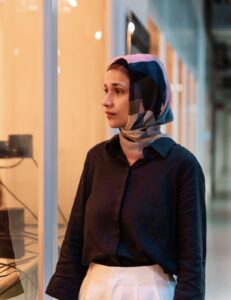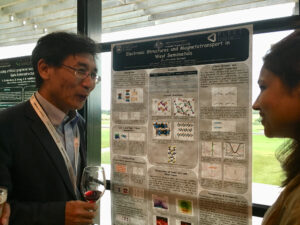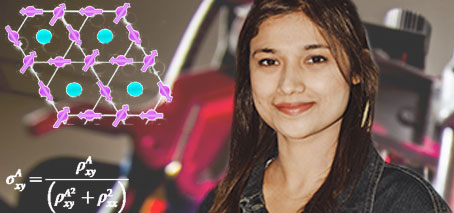
Previously a FLEET PhD student at UOW, Dr. Wafa Afzal still pursues novel materials studies, now at Archer Materials
A note from previous FLEET PhD candidate Dr. Wafa Afzal, still researching novel materials, now at Archer Materials
I was a PhD student at FLEET, based at the University of Wollongong under the supervision of Prof. Xiaolin Wang, studying the electrical and magnetic properties of topological Weyl semimetals.
I’m still researching novel materials, now in the Quantum team at Archer Materials Pty Ltd , working on material functionalization and quantum measurement.
FLEET has been key to my growth as a materials scientist. I got to know a lot of brilliant people in the field, and had an opportunity to collaborate with like minded people with ease. I enjoyed opportunities to listen to amazing speakers via the US/Aus colloquium series and many interesting industry people and their journeys through other talks and forums.
More generally, FLEET shaped so many of my views and has given me a broad vision and horizon in life. It gave me the opportunity to have so many role models to look up to: Tich-Lam with her strength and hard work; Michael with his focussed vision and such an open and down-to-earth personality; Dianne Ruka (outreach officer) with her enthusiasm for Science and its representation in public; and Errol, making sense out of all the things and arranging everything meticulously.

Wafa discussing her work on Weyl semimetals with Prof Qi-Kun Xue, first to realize the quantum anomalous Hall effect (QAHE); FLEET workshop
Every talk, every discussion, every workshop, every presentation, annual conference added something to my knowledge and shaped my way of thinking not just in “science terms” but life in general. About equity and diversity, women’s lack of opportunities in STEM and how to be a voice to change that, about taking science to public by talking about things in a simplified and interesting way, everything became a part of me and will always stay with me.
What do you do now?
I’m now working at Archer Materials Pty Ltd. as a Materials Physics researcher in the Quantum team of the company, involved both with material functionalization and quantum measurement. The company is designing and integrating innovative materials for operating qubits in quantum technologies. Also building graphene transistors for enhanced biosensing and developing semiconductors that push the boundaries of modern technology. The course of development spans qubit processors for practical quantum computing technology, and lab-on-a-chip biosensors for integrated bioelectronics.
I love going to work every day working with an enthusiastic and diverse team, working towards common defined goals.
Here is where FLEET’s training of innovative collaborative work, working towards a broader similar goal, helped me a lot. I am learning a lot of new skills and things every day about research translation, the corporate world, device fabrication and innovation.
How did you go about finding a job
It took a search of a good few months to get a job that I really liked. I would like to mention here a combined discussion by women in FLEET (Meera, Shilpa and a couple of others) helped me a lot as they had mentioned that time after PhD gets a little tough in terms of defining your career path and growth. Whenever I had mixed feelings, I recalled that this is something that everyone goes through. I feel it is so important not just to highlight your glorious moments but also your struggles and the hardest of times, so people can take inspiration and relate to you.
I wear FLEET’s badge with pride and honour, and have experienced that FLEET’s graduates have the respect of the research industry.
Science and research careers give you a sense of fulfilment, not only in terms of your own learning journey but also the feeling of being a small part of contributing towards society’s needs.
Regards, Wafa Afzal
Materials Physics Researcher,
Archer Materials Pty Ltd.

